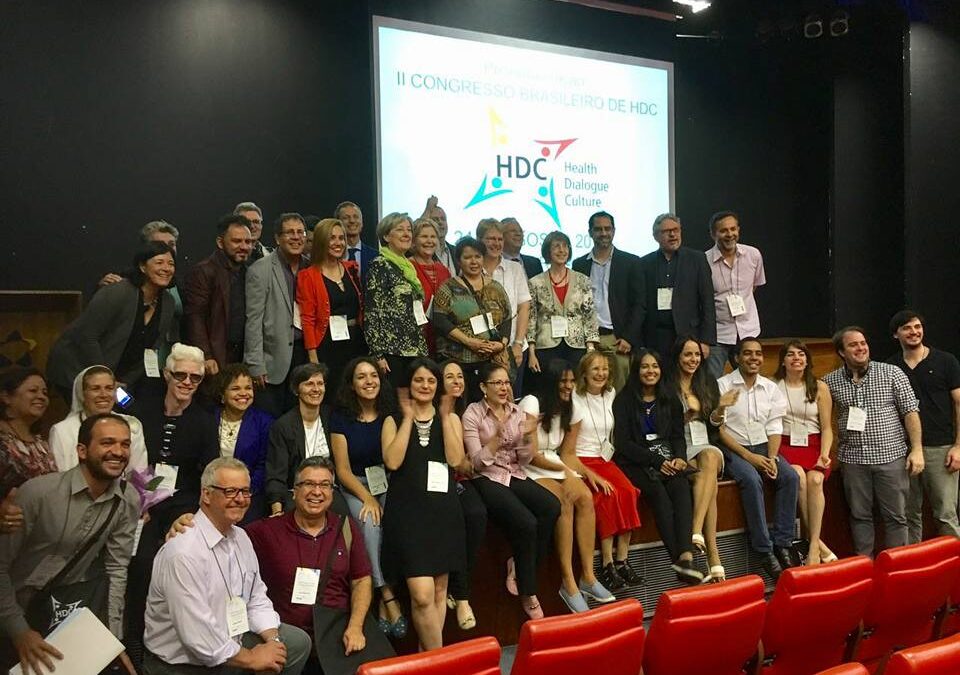
2 Oct 2017 | Focolare Worldwide
 Health as a common good and sustainability of care systems are topics healthcare operators have to face worldwide, especially with the progressive increase of the average life expectancy and the increased need for care. How can the sick be assisted in an effective and likewise sustainable manner? And also: is there a correlation between spirituality and the global health of a person? These were the themes discussed in the convention organised by the Health Dialogue Culture, an international network of healthcare practitioners established in 2003 to contribute through a vital dialogue with science, to a culture that respects life and the dignity and integrity of every person, in the perspective of the promotion of social and individual health. Inspired by the charism of unity of the focolare Movement, Health Dialogue Culture offers room for reflection in connection with practice, from which guidelines are to be drawn as a contribution to the debate on the need to create new paradigms for the healthcare systems. The congress was held as a continuing program with other previous events on the same theme, and particularly with the one held in Padua (Italy) in 2013, entitled What medicine: across globalization, sustainability and personalization of treatments, and with the Letter of Ethics which gathered the results.
Health as a common good and sustainability of care systems are topics healthcare operators have to face worldwide, especially with the progressive increase of the average life expectancy and the increased need for care. How can the sick be assisted in an effective and likewise sustainable manner? And also: is there a correlation between spirituality and the global health of a person? These were the themes discussed in the convention organised by the Health Dialogue Culture, an international network of healthcare practitioners established in 2003 to contribute through a vital dialogue with science, to a culture that respects life and the dignity and integrity of every person, in the perspective of the promotion of social and individual health. Inspired by the charism of unity of the focolare Movement, Health Dialogue Culture offers room for reflection in connection with practice, from which guidelines are to be drawn as a contribution to the debate on the need to create new paradigms for the healthcare systems. The congress was held as a continuing program with other previous events on the same theme, and particularly with the one held in Padua (Italy) in 2013, entitled What medicine: across globalization, sustainability and personalization of treatments, and with the Letter of Ethics which gathered the results. 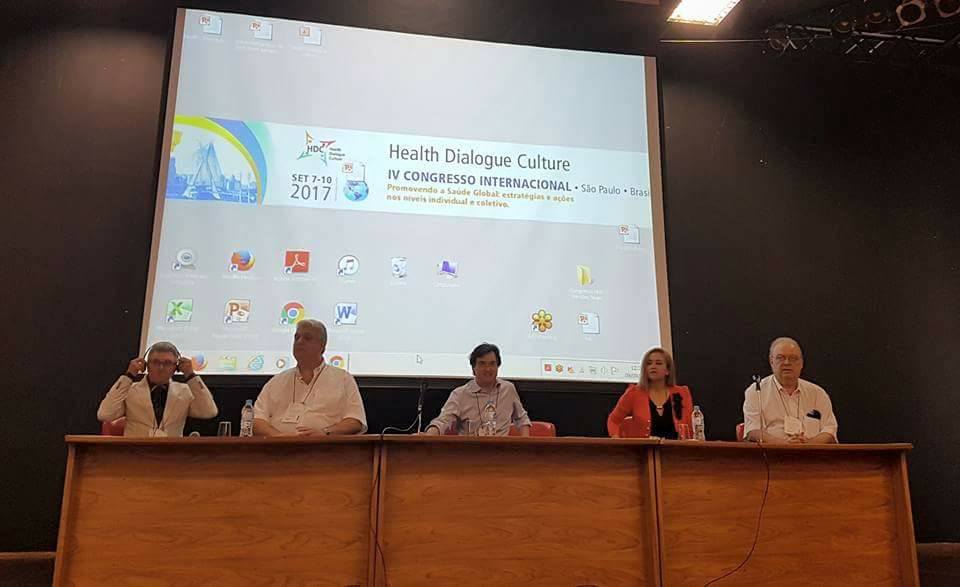 Among the new paradigms for the treatment of the sick person, the relational dimension is taking on an increasingly strategic role, that is, the set of relations at multiple levels (with the patients, among healthcare practitioners, and with the institutions) that revolve around the care issue. Long ignored in the drawing up of socio-healthcare models, also the spiritual dimension, wherever applied, has a substantial impact on the quality of life and the treatment outcomes. The Sao Paolo congress offered a structured programme with reports, labs, workshops, sharing of experiences and good practices, with a fruitful discussion on new methodologies to reach equity and accessibility to healthcare services at local and global levels. «The real challenge of this convention – the organisers said – was the cultural and professional wealth due to the variety of speakers and participants (over 270) and their coming from countries with the most diverse healthcare standards such as Congo, Cameroon, Norway, Venezuela, Chile, Paraguay, Uruguay, Benin, Amazon, Brazil, Dominican Republic, Spain, the UK, Italy and Austria. Particular attention was paid to the themes of disability, ageing, the methods in treating pain and suffering through palliative treatments and the training of operators (care for the caregivers).
Among the new paradigms for the treatment of the sick person, the relational dimension is taking on an increasingly strategic role, that is, the set of relations at multiple levels (with the patients, among healthcare practitioners, and with the institutions) that revolve around the care issue. Long ignored in the drawing up of socio-healthcare models, also the spiritual dimension, wherever applied, has a substantial impact on the quality of life and the treatment outcomes. The Sao Paolo congress offered a structured programme with reports, labs, workshops, sharing of experiences and good practices, with a fruitful discussion on new methodologies to reach equity and accessibility to healthcare services at local and global levels. «The real challenge of this convention – the organisers said – was the cultural and professional wealth due to the variety of speakers and participants (over 270) and their coming from countries with the most diverse healthcare standards such as Congo, Cameroon, Norway, Venezuela, Chile, Paraguay, Uruguay, Benin, Amazon, Brazil, Dominican Republic, Spain, the UK, Italy and Austria. Particular attention was paid to the themes of disability, ageing, the methods in treating pain and suffering through palliative treatments and the training of operators (care for the caregivers). 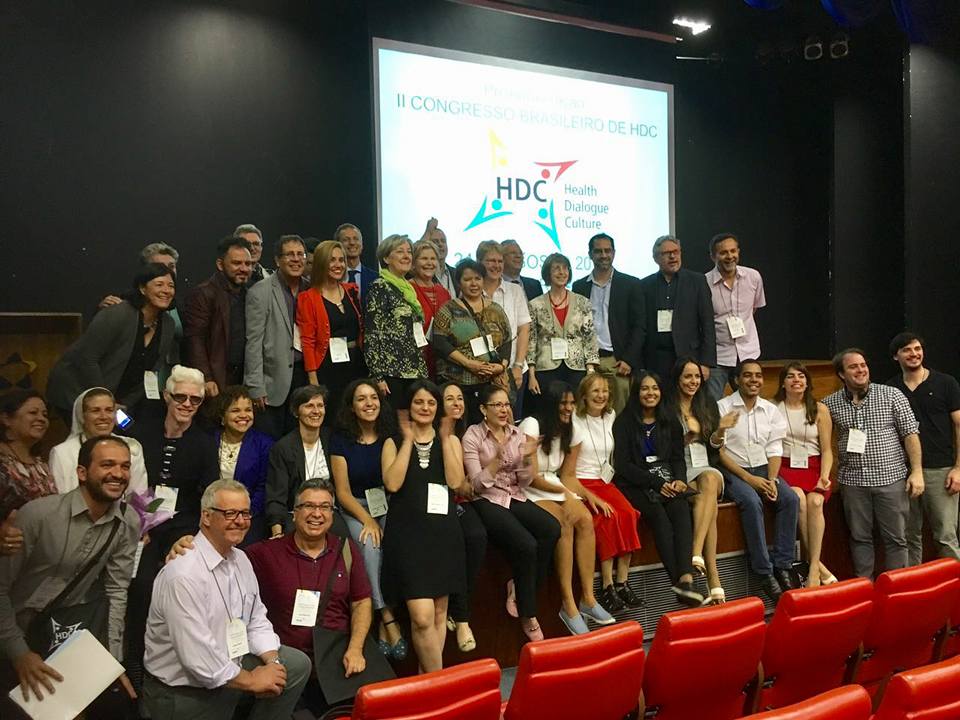 A specific programme was activated during the Congress with interactive sessions for students and young professionals of the biomedical area. A young student of medicine commented at the end of the works: “This congress has changed my ideas on medicine, with new ideas that make me a better person, and with the certainty that they also will make me a better professional.” A Brazilian doctor: “Science is not cold and distant. We have learned that we can practice science without forgetting the essence which unites us: Love.” Maria Voce, Focolare President, sent a message to the participants with the wish that they would “live their professions with a love that generates fraternity, all tending towards the good of the human family.” She recalled a phrase of Chiara Lubich was recalled: «Equilibrium of love lies in loving each single person next to us and working for the entire community from our own corner of life.”
A specific programme was activated during the Congress with interactive sessions for students and young professionals of the biomedical area. A young student of medicine commented at the end of the works: “This congress has changed my ideas on medicine, with new ideas that make me a better person, and with the certainty that they also will make me a better professional.” A Brazilian doctor: “Science is not cold and distant. We have learned that we can practice science without forgetting the essence which unites us: Love.” Maria Voce, Focolare President, sent a message to the participants with the wish that they would “live their professions with a love that generates fraternity, all tending towards the good of the human family.” She recalled a phrase of Chiara Lubich was recalled: «Equilibrium of love lies in loving each single person next to us and working for the entire community from our own corner of life.”

1 Oct 2017 | Non categorizzato
 The International Day of Older Persons is celebrated on 1 October every year, as established by the United Nations in 1990. The objective is to heighten awareness of the issues regarding the elderly and show appreciation for their contribution to society. According to the World Health Organization, in 2050 the world population of people over 60 will reach 2 billion. The phenomenon of longevity will, however, involve most of the countries worldwide with strong repercussions on economic and social life. The elderly represent not only a cost, especially in terms of assistance, but they also contribute greatly to society. It is not surprising, therefore, that the day after (for the Catholic church it is the feast of the Guardian Angels), many countries will honor all grandparents. Without them, authentic “guardian angels” of the family, it would be really difficult for couples to reconcile work and care for their children.
The International Day of Older Persons is celebrated on 1 October every year, as established by the United Nations in 1990. The objective is to heighten awareness of the issues regarding the elderly and show appreciation for their contribution to society. According to the World Health Organization, in 2050 the world population of people over 60 will reach 2 billion. The phenomenon of longevity will, however, involve most of the countries worldwide with strong repercussions on economic and social life. The elderly represent not only a cost, especially in terms of assistance, but they also contribute greatly to society. It is not surprising, therefore, that the day after (for the Catholic church it is the feast of the Guardian Angels), many countries will honor all grandparents. Without them, authentic “guardian angels” of the family, it would be really difficult for couples to reconcile work and care for their children.
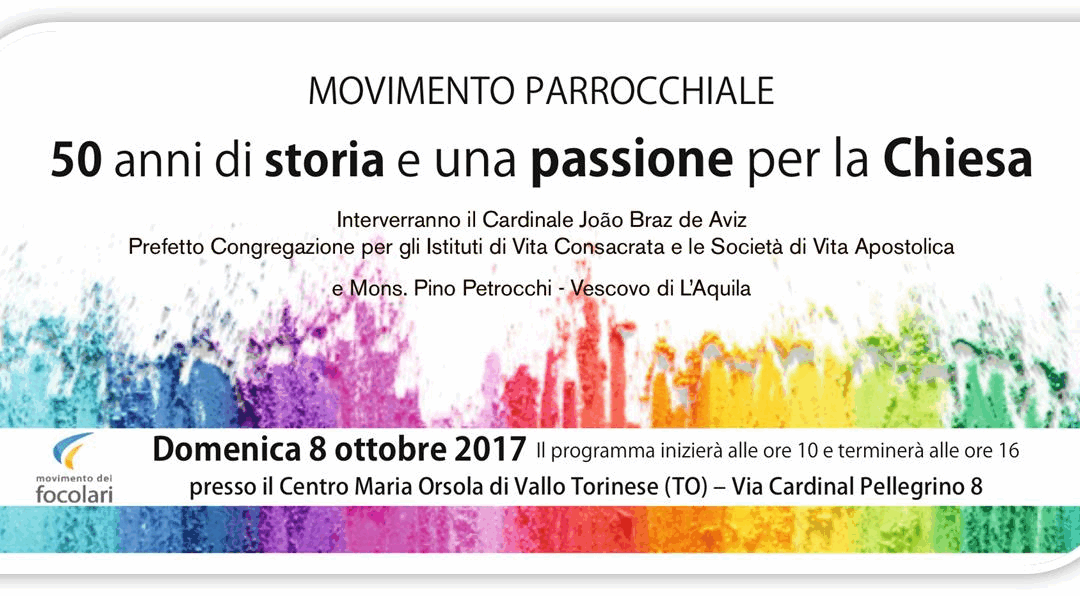
29 Sep 2017 | Non categorizzato
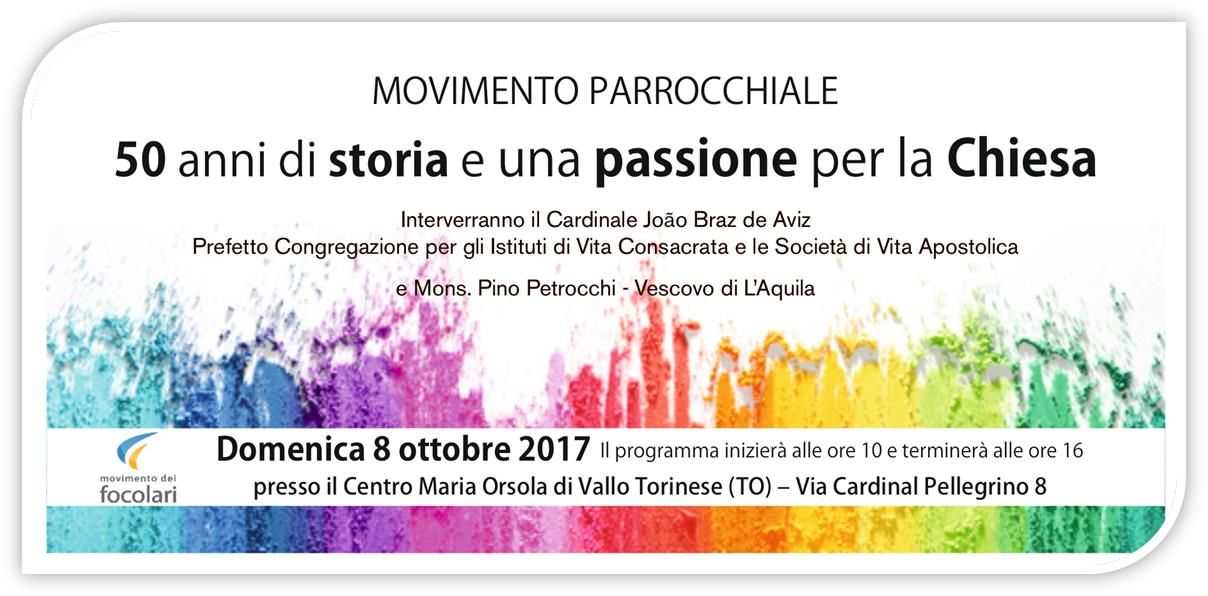 A day-long gathering at Maria Orsola Centre, titled “A Fifty year story of passion for the Church”. Alongside the presentations of a few experiences and artistic interludes, Cardinal Joao De Aviz, prefect of the Congregation for the Institutes of Consecrated Life, once bishop of Brasilia, will give a talk titled From the Peripheries of the World to the Vatican, and Archbishop Giuseppe Petrocchi, bishop of Aquila will talk about The Calling of the Parish Movement in the light of Juvenescit Ecclesia. Press Releases
A day-long gathering at Maria Orsola Centre, titled “A Fifty year story of passion for the Church”. Alongside the presentations of a few experiences and artistic interludes, Cardinal Joao De Aviz, prefect of the Congregation for the Institutes of Consecrated Life, once bishop of Brasilia, will give a talk titled From the Peripheries of the World to the Vatican, and Archbishop Giuseppe Petrocchi, bishop of Aquila will talk about The Calling of the Parish Movement in the light of Juvenescit Ecclesia. Press Releases
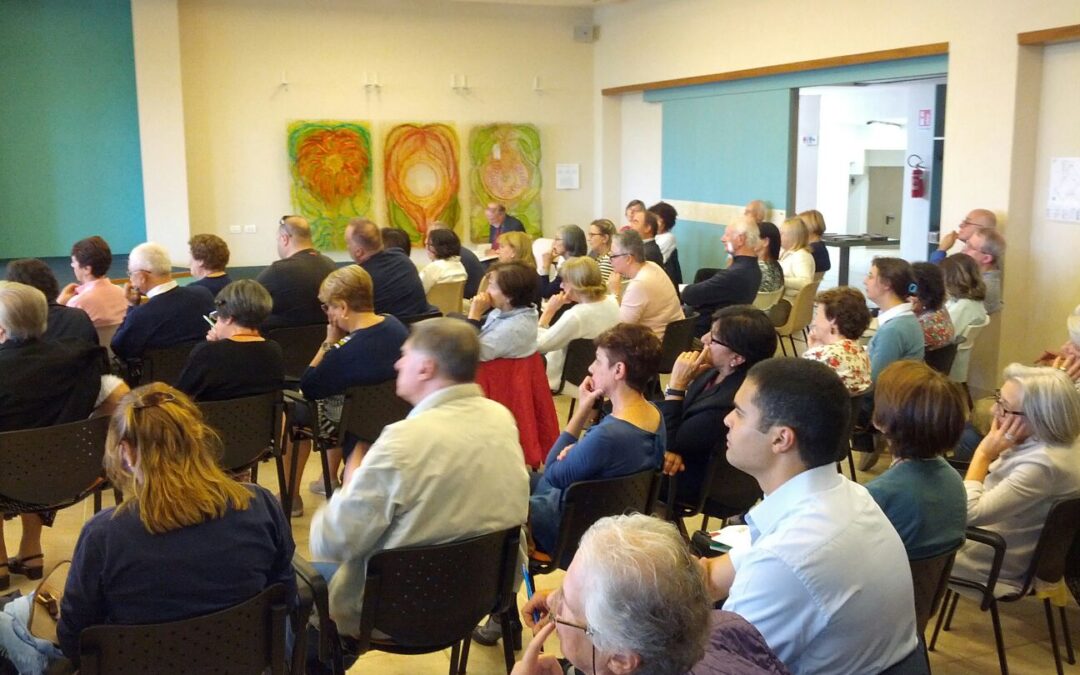
29 Sep 2017 | Non categorizzato
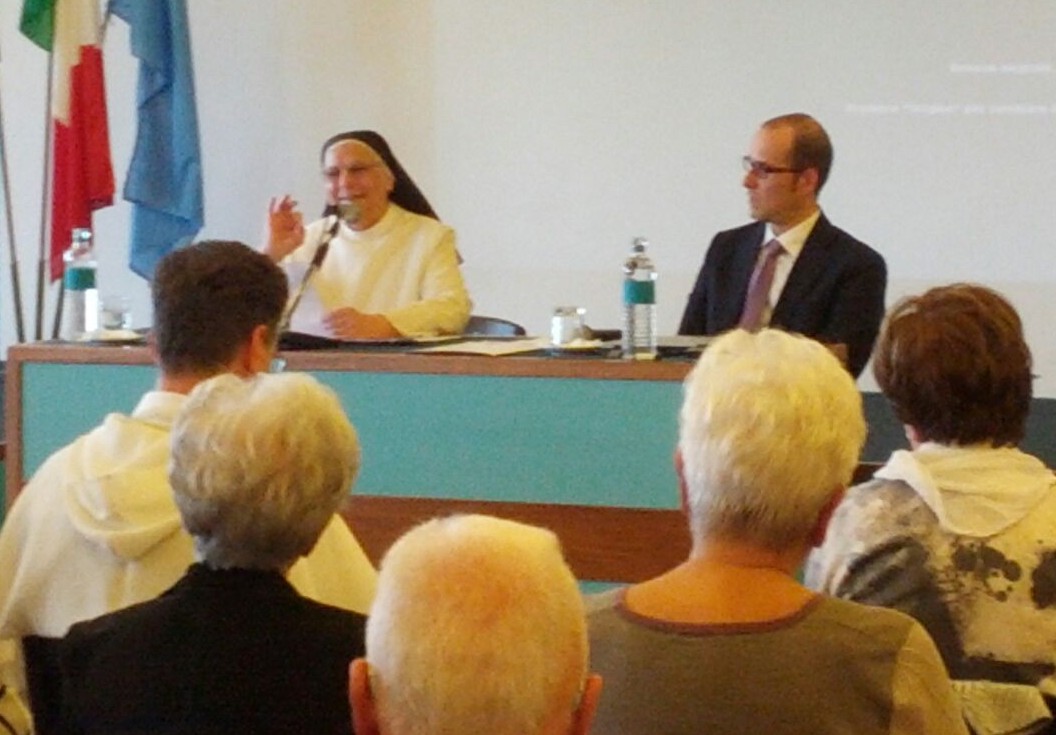 Saturday, 23 September 2017, in the Lecture Hall of the Sophia University Institute (SUI): from the introductory remarks of Mons. Buoncristiani, Archbishop of Siena, and of Maria Voce, President of the Focolare Movement and Vice-Chancellor of the Sophia University Institute, the harmony and the affinity between the two charismatic figures were apparent. These two figures have offered not only the ecclesial space but the whole civil society of their respective periods, an example of a fruitful fusion between spirituality and incarnation, continuously working at the challenges of common living. As Marco Luppi, moderator, opened the conference, he noted the continuity between the proposals of the “happy brigade” of the Catherinites and the spirituality of unity of the Focolare, recalling how various cornerstones of the Saint of Siena’s thought – the uniqueness of the choice of God, the generative value of God’s will, the importance of living the present moment – had been taken up and re-actualized by Chiara Lubich. He recalled that Igino Giordani, co-founder of the Focolare Movement, had initially embarked on the path traced by Caterina’s experience, fascinated by the demonstration of holiness within reach of everyone and the message of universality in her proposal of the Christian choice. The famous connection, “I – my brother – God,” was promoted by Giordani as a fruitful process of interrelation that completes the anthropological dimension with a spiritual openness to divine paternity in Christian meaning. The focal point of the conference was the two main discourses. Sister Elena Ascoli O.P., with her theme “The mysticism of the encounter,” retraced the intimate and concrete dimension of the “mysticism of fire” in Catherine. Christian hope, in the Saint of Siena, becomes a real vocational path in the search for the meaning of living at the service of society and of the Church. 381 letters and numerous collections of hymns and prayers make Catherine the saint of the encounter and of dialogue, animated by the awareness of those who find that the “inner fire,” the relationship with God, represents a patrimony that multiplies its value if it is given, if it builds a relational dynamic of concrete love to one’s neighbour, and if it contributes to the building of associated living in the search for the common good.
Saturday, 23 September 2017, in the Lecture Hall of the Sophia University Institute (SUI): from the introductory remarks of Mons. Buoncristiani, Archbishop of Siena, and of Maria Voce, President of the Focolare Movement and Vice-Chancellor of the Sophia University Institute, the harmony and the affinity between the two charismatic figures were apparent. These two figures have offered not only the ecclesial space but the whole civil society of their respective periods, an example of a fruitful fusion between spirituality and incarnation, continuously working at the challenges of common living. As Marco Luppi, moderator, opened the conference, he noted the continuity between the proposals of the “happy brigade” of the Catherinites and the spirituality of unity of the Focolare, recalling how various cornerstones of the Saint of Siena’s thought – the uniqueness of the choice of God, the generative value of God’s will, the importance of living the present moment – had been taken up and re-actualized by Chiara Lubich. He recalled that Igino Giordani, co-founder of the Focolare Movement, had initially embarked on the path traced by Caterina’s experience, fascinated by the demonstration of holiness within reach of everyone and the message of universality in her proposal of the Christian choice. The famous connection, “I – my brother – God,” was promoted by Giordani as a fruitful process of interrelation that completes the anthropological dimension with a spiritual openness to divine paternity in Christian meaning. The focal point of the conference was the two main discourses. Sister Elena Ascoli O.P., with her theme “The mysticism of the encounter,” retraced the intimate and concrete dimension of the “mysticism of fire” in Catherine. Christian hope, in the Saint of Siena, becomes a real vocational path in the search for the meaning of living at the service of society and of the Church. 381 letters and numerous collections of hymns and prayers make Catherine the saint of the encounter and of dialogue, animated by the awareness of those who find that the “inner fire,” the relationship with God, represents a patrimony that multiplies its value if it is given, if it builds a relational dynamic of concrete love to one’s neighbour, and if it contributes to the building of associated living in the search for the common good.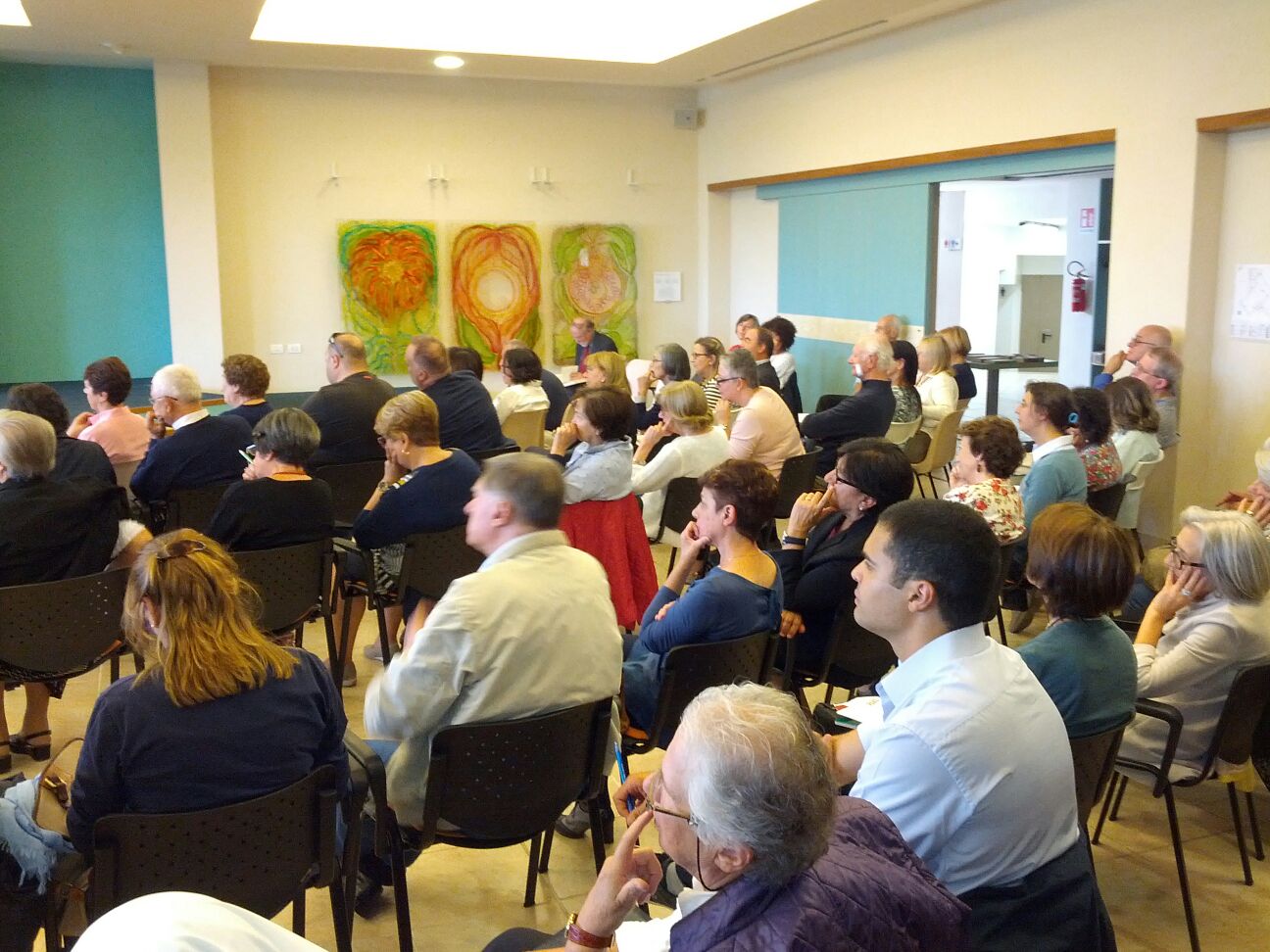 Piero Coda, president of Sophia, in his report titled “Real Love and the One True Love,” proposed an original reading of the generative encounter between the Franciscan roots of Chiara Lubich and the Catherinite period of Giordani, an encounter which reflects an experience of Christian renewal in the foundational period of the Focolare Movement, capable of giving life to a new reality in the Church and in society. The “pact” between charisms generates an originality that emphasises the dynamism of reciprocity as a sounding board for the dimension of unity and becomes the fulcrum of a proposal at the service of humanity. The “mysticism of fire” in Chiara Lubich, recovered by Coda in some passages of her writing, “The Resurrection of Rome,” reminds us how the impetus of inner, individual momentum flourishes in the community dynamics: “It is God who makes two people one, placing himself as the third in a relationship between them: Jesus among us.” In closing, the speech by Dr. Aldo Bernabei, representative of the Roman group of the Catherinites, traced the joint path between his association and the Focolare Movement in the multi-decade animation of the project “Together for Europe,” a demonstration that works steadily to build a European spirit that recognises the Christian soul among its foundation values, a path that joins more than 500 churches, movements, communities and associations.
Piero Coda, president of Sophia, in his report titled “Real Love and the One True Love,” proposed an original reading of the generative encounter between the Franciscan roots of Chiara Lubich and the Catherinite period of Giordani, an encounter which reflects an experience of Christian renewal in the foundational period of the Focolare Movement, capable of giving life to a new reality in the Church and in society. The “pact” between charisms generates an originality that emphasises the dynamism of reciprocity as a sounding board for the dimension of unity and becomes the fulcrum of a proposal at the service of humanity. The “mysticism of fire” in Chiara Lubich, recovered by Coda in some passages of her writing, “The Resurrection of Rome,” reminds us how the impetus of inner, individual momentum flourishes in the community dynamics: “It is God who makes two people one, placing himself as the third in a relationship between them: Jesus among us.” In closing, the speech by Dr. Aldo Bernabei, representative of the Roman group of the Catherinites, traced the joint path between his association and the Focolare Movement in the multi-decade animation of the project “Together for Europe,” a demonstration that works steadily to build a European spirit that recognises the Christian soul among its foundation values, a path that joins more than 500 churches, movements, communities and associations.

 Health as a common good and sustainability of care systems are topics healthcare operators have to face worldwide, especially with the progressive increase of the average life expectancy and the increased need for care. How can the sick be assisted in an effective and likewise sustainable manner? And also: is there a correlation between spirituality and the global health of a person? These were the themes discussed in the convention organised by the Health Dialogue Culture, an international network of healthcare practitioners established in 2003 to contribute through a vital dialogue with science, to a culture that respects life and the dignity and integrity of every person, in the perspective of the promotion of social and individual health. Inspired by the charism of unity of the focolare Movement, Health Dialogue Culture offers room for reflection in connection with practice, from which guidelines are to be drawn as a contribution to the debate on the need to create new paradigms for the healthcare systems. The congress was held as a continuing program with other previous events on the same theme, and particularly with the one held in Padua (Italy) in 2013, entitled What medicine: across globalization, sustainability and personalization of treatments, and with the Letter of Ethics which gathered the results.
Health as a common good and sustainability of care systems are topics healthcare operators have to face worldwide, especially with the progressive increase of the average life expectancy and the increased need for care. How can the sick be assisted in an effective and likewise sustainable manner? And also: is there a correlation between spirituality and the global health of a person? These were the themes discussed in the convention organised by the Health Dialogue Culture, an international network of healthcare practitioners established in 2003 to contribute through a vital dialogue with science, to a culture that respects life and the dignity and integrity of every person, in the perspective of the promotion of social and individual health. Inspired by the charism of unity of the focolare Movement, Health Dialogue Culture offers room for reflection in connection with practice, from which guidelines are to be drawn as a contribution to the debate on the need to create new paradigms for the healthcare systems. The congress was held as a continuing program with other previous events on the same theme, and particularly with the one held in Padua (Italy) in 2013, entitled What medicine: across globalization, sustainability and personalization of treatments, and with the Letter of Ethics which gathered the results.  Among the new paradigms for the treatment of the sick person, the relational dimension is taking on an increasingly strategic role, that is, the set of relations at multiple levels (with the patients, among healthcare practitioners, and with the institutions) that revolve around the care issue. Long ignored in the drawing up of socio-healthcare models, also the spiritual dimension, wherever applied, has a substantial impact on the quality of life and the treatment outcomes. The Sao Paolo congress offered a structured programme with reports, labs, workshops, sharing of experiences and good practices, with a fruitful discussion on new methodologies to reach equity and accessibility to healthcare services at local and global levels. «The real challenge of this convention – the organisers said – was the cultural and professional wealth due to the variety of speakers and participants (over 270) and their coming from countries with the most diverse healthcare standards such as Congo, Cameroon, Norway, Venezuela, Chile, Paraguay, Uruguay, Benin, Amazon, Brazil, Dominican Republic, Spain, the UK, Italy and Austria. Particular attention was paid to the themes of disability, ageing, the methods in treating pain and suffering through palliative treatments and the training of operators (care for the caregivers).
Among the new paradigms for the treatment of the sick person, the relational dimension is taking on an increasingly strategic role, that is, the set of relations at multiple levels (with the patients, among healthcare practitioners, and with the institutions) that revolve around the care issue. Long ignored in the drawing up of socio-healthcare models, also the spiritual dimension, wherever applied, has a substantial impact on the quality of life and the treatment outcomes. The Sao Paolo congress offered a structured programme with reports, labs, workshops, sharing of experiences and good practices, with a fruitful discussion on new methodologies to reach equity and accessibility to healthcare services at local and global levels. «The real challenge of this convention – the organisers said – was the cultural and professional wealth due to the variety of speakers and participants (over 270) and their coming from countries with the most diverse healthcare standards such as Congo, Cameroon, Norway, Venezuela, Chile, Paraguay, Uruguay, Benin, Amazon, Brazil, Dominican Republic, Spain, the UK, Italy and Austria. Particular attention was paid to the themes of disability, ageing, the methods in treating pain and suffering through palliative treatments and the training of operators (care for the caregivers).  A specific programme was activated during the Congress with interactive sessions for students and young professionals of the biomedical area. A young student of medicine commented at the end of the works: “This congress has changed my ideas on medicine, with new ideas that make me a better person, and with the certainty that they also will make me a better professional.” A Brazilian doctor: “Science is not cold and distant. We have learned that we can practice science without forgetting the essence which unites us: Love.” Maria Voce, Focolare President, sent a message to the participants with the wish that they would “live their professions with a love that generates fraternity, all tending towards the good of the human family.” She recalled a phrase of Chiara Lubich was recalled: «Equilibrium of love lies in loving each single person next to us and working for the entire community from our own corner of life.”
A specific programme was activated during the Congress with interactive sessions for students and young professionals of the biomedical area. A young student of medicine commented at the end of the works: “This congress has changed my ideas on medicine, with new ideas that make me a better person, and with the certainty that they also will make me a better professional.” A Brazilian doctor: “Science is not cold and distant. We have learned that we can practice science without forgetting the essence which unites us: Love.” Maria Voce, Focolare President, sent a message to the participants with the wish that they would “live their professions with a love that generates fraternity, all tending towards the good of the human family.” She recalled a phrase of Chiara Lubich was recalled: «Equilibrium of love lies in loving each single person next to us and working for the entire community from our own corner of life.” 




 Saturday, 23 September 2017, in the Lecture Hall of the
Saturday, 23 September 2017, in the Lecture Hall of the  Piero Coda, president of Sophia, in his report titled “Real Love and the One True Love,” proposed an original reading of the generative encounter between the Franciscan roots of Chiara Lubich and the Catherinite period of Giordani, an encounter which reflects an experience of Christian renewal in the foundational period of the Focolare Movement, capable of giving life to a new reality in the Church and in society. The “pact” between charisms generates an originality that emphasises the dynamism of reciprocity as a sounding board for the dimension of unity and becomes the fulcrum of a proposal at the service of humanity. The “mysticism of fire” in Chiara Lubich, recovered by Coda in some passages of her writing, “The Resurrection of Rome,” reminds us how the impetus of inner, individual momentum flourishes in the community dynamics: “It is God who makes two people one, placing himself as the third in a relationship between them: Jesus among us.” In closing, the speech by Dr. Aldo Bernabei, representative of the Roman group of the Catherinites, traced the joint path between his association and the Focolare Movement in the multi-decade animation of the project “Together for Europe,” a demonstration that works steadily to build a European spirit that recognises the Christian soul among its foundation values, a path that joins more than 500 churches, movements, communities and associations.
Piero Coda, president of Sophia, in his report titled “Real Love and the One True Love,” proposed an original reading of the generative encounter between the Franciscan roots of Chiara Lubich and the Catherinite period of Giordani, an encounter which reflects an experience of Christian renewal in the foundational period of the Focolare Movement, capable of giving life to a new reality in the Church and in society. The “pact” between charisms generates an originality that emphasises the dynamism of reciprocity as a sounding board for the dimension of unity and becomes the fulcrum of a proposal at the service of humanity. The “mysticism of fire” in Chiara Lubich, recovered by Coda in some passages of her writing, “The Resurrection of Rome,” reminds us how the impetus of inner, individual momentum flourishes in the community dynamics: “It is God who makes two people one, placing himself as the third in a relationship between them: Jesus among us.” In closing, the speech by Dr. Aldo Bernabei, representative of the Roman group of the Catherinites, traced the joint path between his association and the Focolare Movement in the multi-decade animation of the project “Together for Europe,” a demonstration that works steadily to build a European spirit that recognises the Christian soul among its foundation values, a path that joins more than 500 churches, movements, communities and associations.